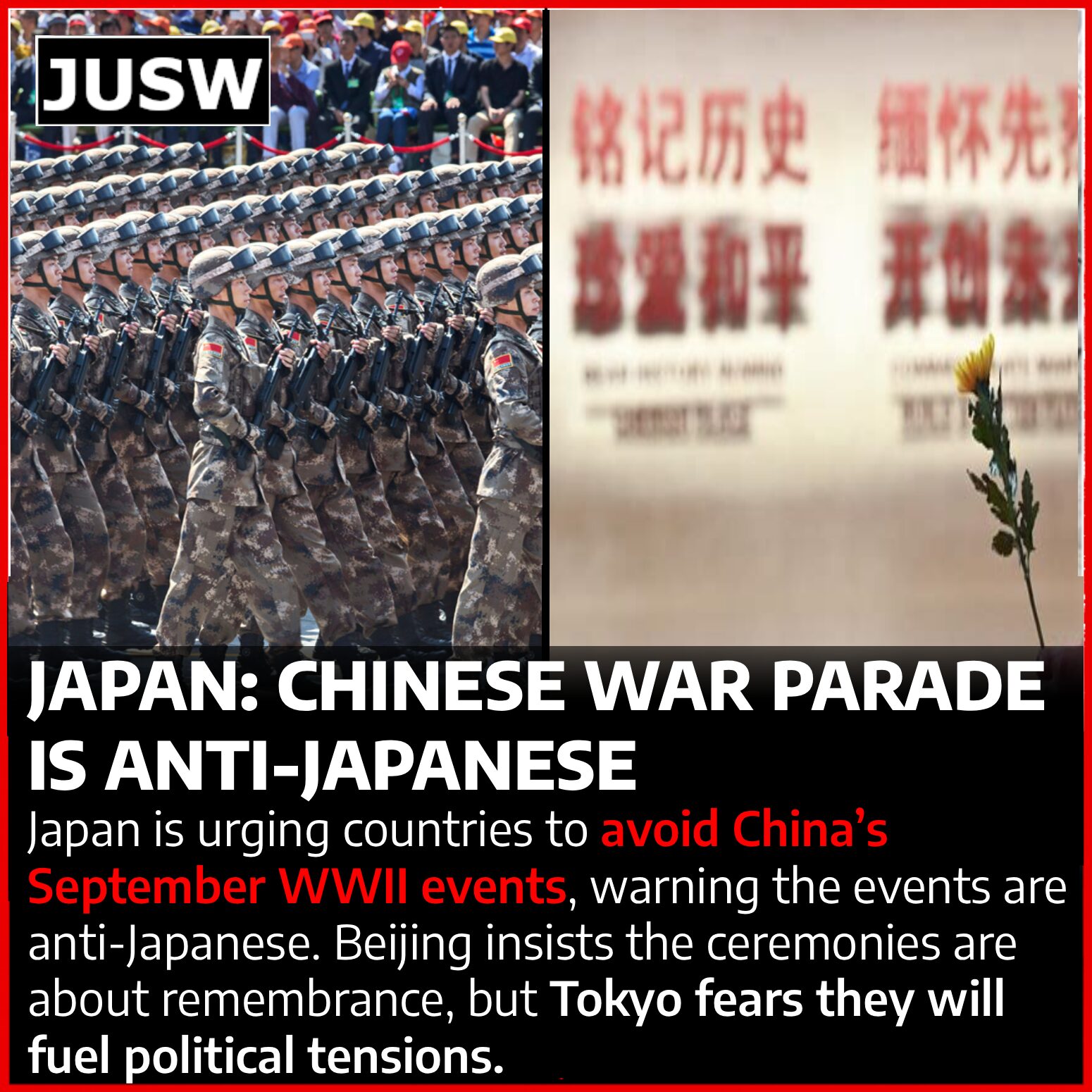Japan Urges Allies to Boycott China’s WWII Anniversary Events
As China prepares a sweeping commemoration for the 80th anniversary of the end of World War II this September, Japan has quietly but firmly urged nations in both Europe and Asia to reconsider their participation. At the heart of Tokyo’s concerns is Beijing’s plan to stage a massive military parade in Tiananmen Square, an event Japanese officials fear could be less about honoring peace and more about political messaging that casts Japan as the villain of history.
This diplomatic push underscores the fragile balance in East Asia, where memories of World War II remain deeply embedded in politics, education, and national identity. Japan’s request to skip the commemorations is not just about optics. It is about the battle over historical narratives that continues to shape relations between two of the region’s most powerful nations.
Beijing’s Grand Plans for September
China’s commemorations are expected to feature a large military parade in central Beijing, with thousands of troops marching, advanced weaponry on display, and high-profile attendance from foreign dignitaries. The Chinese government frames these events as solemn remembrance for the sacrifices of its people during the war, particularly the brutal Japanese invasion that claimed millions of lives in Nanking and other regions.
State media has emphasized themes of peace and unity, portraying the anniversary as both a tribute to the past and a statement of China’s global standing today. For Beijing, the events are an opportunity to strengthen domestic nationalism and project international influence, presenting China as a leading force for stability in Asia.
Tokyo’s Concerns
For Japan, the optics are troubling. Senior officials fear that China’s commemorations will highlight wartime atrocities in a way that amplifies anti-Japanese sentiment, potentially undermining diplomatic trust at a time when regional security requires cooperation. Japan has asked partner nations to approach the events with caution, warning that their participation could be interpreted as tacit endorsement of Beijing’s narrative.
Prime Minister Ishiba’s government has made restoring ties with neighboring countries a priority, particularly with South Korea, where a historic joint declaration was recently signed. But relations with China remain tense, with disputes over history, territorial claims in the East China Sea, and growing military activity around Taiwan all contributing to friction.
The Historical Shadow
The legacy of World War II still casts a long shadow across East Asia. In China, the memory of Japanese occupation is reinforced through textbooks, films, and public memorials. The Nanjing Massacre, forced labor, and other atrocities remain central to the country’s wartime narrative. For many Chinese citizens, commemorations are not only about honoring the dead but also about demanding accountability from Japan.
In Japan, the story is more complex. While pacifism and remembrance of Hiroshima and Nagasaki dominate national memory, there is discomfort with how China frames its victimhood. Tokyo insists that it has expressed remorse and taken steps toward reconciliation, yet tensions resurface whenever Beijing uses wartime history as a political tool.
International Reactions
So far, most countries have remained cautious in responding to Japan’s appeals. European governments, balancing economic ties with both China and Japan, have not announced definitive positions. Some Southeast Asian nations, themselves occupied by Japan during the war, may be more inclined to attend China’s events out of solidarity. Others may quietly abstain to avoid offending Tokyo.
The United States, Japan’s closest ally, faces its own calculation. Washington maintains a competitive yet interdependent relationship with Beijing, and participation in the commemorations could be interpreted as a political signal. At the same time, absence would strengthen Japan’s diplomatic position but risk further straining ties with China.
Broader Implications for East Asia
This diplomatic tug-of-war highlights how unresolved history continues to influence modern geopolitics in the region. The commemoration is not merely about remembering the past. It is about shaping the present balance of power. By pressing allies to avoid Beijing’s ceremonies, Japan is signaling its determination to resist what it sees as propaganda aimed at undermining its international standing.
The dispute also comes at a moment of heightened military tensions. Russia recently conducted missile drills in the Sea of Japan, while U.S. and Japanese forces continue to strengthen defense cooperation. In this environment, China’s military parade takes on added significance as a show of strength.
Conclusion
The controversy surrounding China’s WWII anniversary commemorations illustrates how history remains alive in East Asia’s political struggles. For China, the events are about remembrance and national pride. For Japan, they risk reopening wounds that it believes should be closed in the name of regional cooperation.
As September approaches, the choices of other nations—whether to attend or quietly abstain—will be closely watched. Their decisions will reveal how the international community navigates the delicate balance between acknowledging history, maintaining diplomatic ties, and managing the realities of modern geopolitics.
What is clear is that the legacy of World War II is far from over. It continues to shape foreign policy, fuel nationalism, and test the fragile bonds between neighbors in one of the world’s most strategically vital regions.

